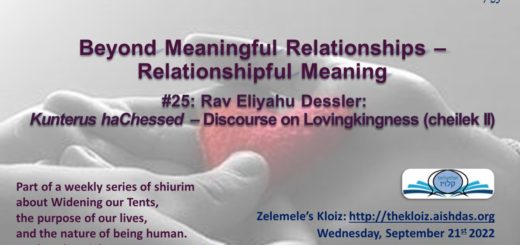Two Tzadiqim on Loving the Evildoer
I found the following on a web site called “Two Tzaddiks: The Teachings of Rebbe Pinchas of Koretz and His Disciple, Rebbe Raphael of Bershad”:
“In his teachings, R. Pinchas preached universal love, even love of the most sinful people in humanity, because only such love can hasten the coming of the Redeemer”. (Ideas and Ideals of the Hassidim, by Milton Aron, pp. 63−64)
[R’ Pinchas of Koretz] once said: “Who is a consummate tzadik? He who loves a consummate rasha [wicked person]. Who is an incomplete tzadik? He who loves an incomplete rasha.” Ginsburgh explains: “In the inner [depths] of one’s soul, it is the very highest level of tzadik that reaches down in love to raise up the very lowest level of rasha. The inherent goodness of the consummate tzadik sweetens the existential suffering of the consummate rasha”. (The Mystery of Marriage: How to Find True Love and Happiness in Married Life, by Yitzchak Ginsburgh, p. 89)
R’ Pinchas said: “One must love even the sinful, but must hate their actions. Although it is forbidden to be close to the wicked, one must still love them, so that perhaps they will return to the path of the Torah. As our Rabbis teach us regarding Aharon, ‘He loved peace and actively pursued peace and brought people closer to Torah.’ (Pirkei Avot 1:12) By loving his fellow men, Aharon brought them close to Torah, bringing them back to the correct path. Although the Gemara (Pesachim 113) says that if one sees his friend sinning, it is a mitzvah to hate him, Sefer Hatanya (ch. 32) limits this to a friend who generally observes Torah and mitzvot, yet has spurned proper rebuke. However, regarding a person with whom one is not friendly in this manner, we find in Pirkei Avot, ‘Hillel was fond of saying, “Be a student of Aharon—love peace … love G-d’s creatures, and bring them closer to the Torah.”’ This refers even to those who are distant from Torah and the service of G-d, and for that reason are referred to merely as ‘creatures.’ They have to be drawn with bonds of love, hopefully bringing them back to serve G‑d”. (“Covenant of Peace,” by Mordechai Greenberg)
R’ Pinchas said: “How can we daven for someone to do teshuva? Are we not taught, ‘All is in the hand of heaven, except for the fear of heaven?’ But Hashem includes all souls, and whatever is in the Whole is also in each part. Each soul therefore includes all other souls. When you yourself do teshuva, you can bring your neighbor to do teshuva. This is because you are included in your neighbor, and your neighbor is included in you”. (Midrash Pinhas, cited in A Call to the Infinite, by Aryeh Kaplan, cited in “Included in Your Neighbor,” at A Simple Jew)
R’ Raphael said: “Love the man of wickedness. Why? Because he will then love you, and love will unite his soul and yours. As a consequence, inasmuch as you hate wickedness, you will transfer your hate to him, thereby causing him to repent and turn from evil to good”. (Midrash Pinhas, p. 51, cited in The Hassidic Anthology, by Louis I. Newman, p. 220. Reprinted with permission of Ann Newman)
R’ Raphael said: “A man should not think contemptuously of his ability to do good. Let him but choose and G-d does the rest. Is there any limit to G-d’s ability?”. (Midrash Pinhas, p. 44, cited in The Hassidic Anthology, p. 97)
“From our teacher, the rabbi, Rabbi Raphael [of Bershad] … may his light shine upon us: ‘“You shall love your neighbour as yourself” said Rabbi Akiva: “This is the greatest principle of the Torah.”’ The SHeLaH (R. Isaiah Horowitz, c. 1570-1626) poses the question that this is all very well with respect to [commandments] between one person and another, but with respect to [commandments] between a person and G-d, what is there to say? See there. At first, he—may his light shine upon us—said: ‘According to the plain meaning, when a person loves, the Shechinah rests upon them. In this way, “all workers of iniquity are dispersed” (Psalms 92:10) and it is easy to fulfill the Torah.’
“Later he expounded along the lines of what is written in the writings of R. Fradl … that this is by virtue of not being impatient with one’s fellows, but accepting everything with patience, without one’s heart becoming agitated and being impatient about the slightest thing. Without all this, it is impossible to fulfill ‘You shall love your neighbour as yourself’ unless one has set aside the attribute of impatience, which is [derived] from the attribute of Power [Gevurah], and in this way, does not use the attribute of Power in matters of this world. [Then] it is easy [to utilize] the power of this attribute to be fearful and agitated before the blessed G-d. And this is the greatest principle of the Torah”. (Imrei Pinchas HaShalem, p. 32, cited in “The Loving One’s Neighbour as Oneself,” by Larry Tabick)
R’ Pinchas said: “My Rafael knows how to love the most wicked evil-doers!”. (Tales of the Hasidim: Early Masters, by Martin Buber, p. 130)
R’ Pinchas said: “If men did not sin, the Lord would have no occasion to employ His attributes of mercy, compassion, and the like, but only His attributes of justice. Therefore, it follows that even sinners please the Lord; they bring into play His worthiest attributes”. (Nofeth Tzufim, p. 17 (A), cited in The Hasidic Anthology, p. 44; and, similarly, in Ideas and Ideals of the Hassidim, p. 66)



Recent Comments